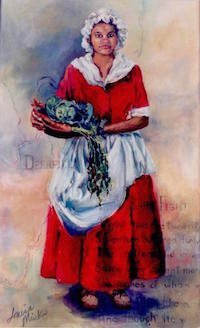
Like many slaves of Colonial America, Lucy Terry came to Rhode Island from Africa as a very young child in the early 1730s. Purchased by Ebenezer Wells of Massachusetts, Lucy grew up in a time of turmoil with local Native American tribes in the colonies of America.
In 1746, local tribes ambushed two white families in her town of Deerfield, MA – in an area of town known then as “the Bars” – a colonial term for meadow. In response to this atrocity, Lucy, now 16 (possibly 14) composed the ballad called “Bars Fight” that same year. In this poem, she commemorates the slain men and women of this attack. She won local acclaim for her ballad which read:
August ’twas the twenty-fifth,
Seventeen hundred forty-six;
The Indians did in ambush lay,
Some very valiant men to slay,
The names of whom I’ll not leave out.
Samuel Allen like a hero fout,
And though he was so brave and bold,
His face no more shalt we behold
Eteazer Hawks was killed outright,
Before he had time to fight, –
Before he did the Indians see,
Was shot and killed immediately.
Oliver Amsden he was slain,
Which caused his friends much grief and pain.
Simeon Amsden they found dead,
Not many rods distant from his head.
Adonijah Gillett we do hear
Did lose his life which was so dear.
John Sadler fled across the water,
And thus escaped the dreadful slaughter.
Eunice Allen see the Indians coming,
And hopes to save herself by running,
And had not her petticoats stopped her,
The awful creatures had not catched her,
Nor tommy hawked her on the head,
And left her on the ground for dead.
Young Samuel Allen, Oh lack-a-day!
Was taken and carried to Canada.
While she is known to have been a poet throughout most of her life, only her “Bars Fight” ballad has survived. Her contribution to the literary world established her as an author of the first known work of African American literature (1746) although it wasn’t physically published until 1855 – over 30 years after Lucy’s death.
Unlike many other slave stories, Lucy became a free woman when her future (free) husband, Obijah (Abijah) Prince, purchased her from her owner in 1756. She later went on to be an eloquent orator and courageous activist against slavery. In the 1780s, when a local white man tried to steal the Princes’ property, Lucy argued her land case to the Supreme Court and ultimately won. Lucy died in 1821 at the ripe old age of (roughly) 89-90.
